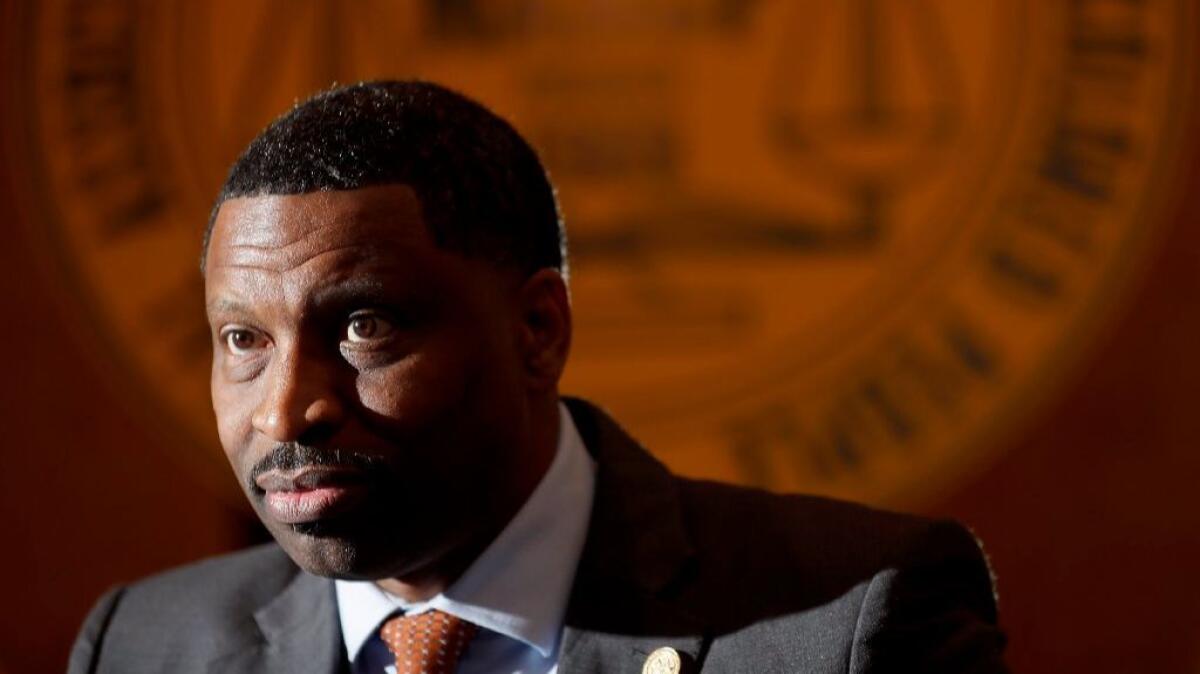Q&A: Derrick Johnson, the newly elected president of NAACP, talks Trump, voting rights and NFL protests

Derrick Johnson isn’t a household name. He’s never held elected office, rarely appears on television and speaks with an unassuming air verging on shyness.
And so — at first glance — he seems a surprising pick for his new gig as the public face of one of the country’s most prominent civil rights groups.
This month, Johnson, a Mississippian with a degree from the South Texas College of Law, was officially selected president of the National Assn. for the Advancement of Colored People. He’d been interim president since the summer.
His rise follows the May ouster of former President Cornell William Brooks — part of a “system-wide refresh” that the organization said was necessary to push back more effectively against President Trump on issues like voting rights and criminal justice.
Johnson, 49, spoke with The Times about Trump, the group’s warnings to African Americans about discrimination by the state of Missouri and American Airlines, and what he hopes to accomplish as president. The interview has been edited for length and clarity.
Some African Americans have said they were looking for younger leadership with the NAACP. What do you say to someone who would have liked to have seen a younger leader?
I would love to see young people get involved. For the NAACP, our role is to create a space so young people can have a voice.… That’s a great thing, because our young activists today are the leaders of tomorrow. And social justice is not a competition, it’s an opportunity to lend voice to critical issues that impact communities across the country.
The organization has made some bold proclamations recently — issuing a travel advisory for Missouri, warning blacks against traveling on American Airlines. These are somewhat outside the norm of what the NAACP has done in the past.
When you look at Missouri, our local units on the ground brought to our national convention the problem of a recent line of public policies adopted in Missouri, which they felt would create potential harm to African Americans. [A law that took effect in August has made it more difficult for employees to prove that their protected class, such as a race or gender, directly led to unlawful discrimination.]
The travel advisory made sense because it’s saying “travelers be aware that in the state of Missouri the rights of African Americans are not valued the same, and if you’re traveling through the state, here are some of the consequences that you could be faced with.”
We also began to look at the recent activities with American Airlines, which started in April of last year, with our state conference president in North Carolina — Dr. William Barber — who was escorted off a plane. So as we began to look closer, we’ve seen a series of activities where people were being taken off the plane. They appeared to us to have been racialized events, a pattern had been established and we felt it incumbent upon us as an organization to alert the African American community that this is an issue, we see a pattern, so be advised.
Is there anything on the horizon for what the NAACP might suggest blacks boycott or avoid?
We have not called for boycotts.…We take very serious the question of boycotts and that’s not anything we rush to do at any point.
So these are not boycotts?
We’re not telling people not to travel on American Airlines. We’re not telling people not to go to Missouri. We’re saying that if you travel on this air carrier, if you decide to go to the state of Missouri, here are some scenarios that we are concerned with, so be advised.
How do you view the organization’s role under the Trump administration?
It’s the same under any administration. We are a membership-based advocacy organization. Our goal is to advocate for public policy to meet the needs of the communities we represent. But the Trump administration has presented certain challenges. The political landscape is much more aggressive around racial issues. Charlottesville is an example of that. So at the NAACP we must step up to be that voice for communities who may not have voices.
Do you think your job is more challenging under a President Trump than it would be under a President Obama?
I think our job is different. Not necessarily more challenging. There are many policies that we would like to see adopted across the board. What we found under the Obama administration is … the most devastating Supreme Court decision dealing with access to voting that we’ve seen in some 40 years [striking down a key provision of the 1965 Voting Rights Act that barred several Southern states from changing election rules without federal approval]. That was a challenge because last year we went into the first presidential election since 1965 without the coverage of the Voting Rights Act in jurisdictions that need that coverage.
What are some specific efforts you’re going to address in your first year?
Well the No. 1 thing we feel we must do as a social-justice association is that we need to increase voter participation during this midterm election. Elections have consequences and we recognize a key benchmark in this process is coming up in 2018 in November. African Americans are high-percentage voters during presidential elections. Our percentage of participation drops substantially during midterm elections. It is a key factor for the NAACP to engage our members from across the country to work hard over the next several months to increase voter turnout for the November 2018 elections.
NFL Commissioner Roger Goodell and Trump both have pushed back against players kneeling during games. Some have criticized how two white men are essentially telling black athletes how to behave. What are your thoughts about this?
One of the things that we value as a community, as an association, is the platform that professional athletes have to give voice to social-justice issues that are important to them. We’ve seen that with Jim Brown, we’ve seen it with Muhammad Ali, we’ve seen that with Kareem Abdul-Jabbar. We will advocate as much as possible to ensure that the athletes of today will continue to use their platform for social justice that has always been an important vehicle for African Americans, and we do not want that suffocated in today’s times.
It’s being suffocated?
It’s being suffocated when players are saying that they are taking a knee in protest of the league’s inability to respect the talents of one player [Colin Kaepernick, the former San Francisco 49ers player who remains unsigned] who decided to take a knee to address the question of aggressive policing in our community. If that’s in fact what’s taking place, it is being suffocated.
Finish this sentence: The NAACP must be better at …
Encouraging our members and our communities to engage civically in the voting process to ensure our voices are heard.
Sign up for Essential California
The most important California stories and recommendations in your inbox every morning.
You may occasionally receive promotional content from the Los Angeles Times.








